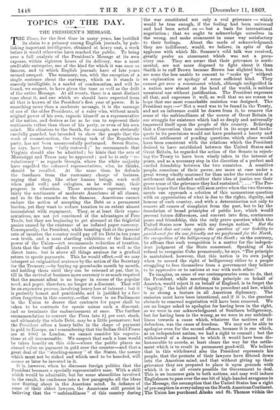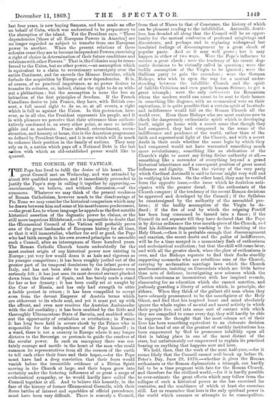TOPICS OF THE DAY.
THE PRESIDENT'S MESSAGE.
THE Times, for the first time in many years, has justified its claim to a primacy among English journals, by pub- lishing important intelligence, obtained at heavy cost, a week before it would otherwise have reached the public. To bring over a full analysis of the President's Message at its own expense, within eighteen hours of its delivery, was a most creditable enterprise, one of the kind for which it was once so famous, and to which English journals have of late years seemed unequal. The summary, too, with the exception of a single sentence about the currency, which as it stands is scarcely intelligible, is a model of condensation, and will be found, we suspect, to have given the tone as well as the drift of the entire Message. At all events, there is a most distinct tone about it, and one which we should have expected from all that is known of the President's first year of power. It is something more than a moderate message, it is the message of one of the older Presidents, of a ruler who, without much original power of his own, regards himself as a representative of the nation, and desires as far as he can to represent their sentiments rather than those of his party, or even of his own mind. His allusions to the South, for example, are obviously carefully guarded, but intended to show the people that the work of reconstruction, the testing task of the Republican party, has not been unsuccessfully performed. Seven States, he says, have been "fully restored ;" he recommends that Virginia should also be admitted ; he hints that the acts of Mississippi and Texas may be approved ; and he is only " re- volutionary " as regards Georgia, where the white majority have expelled the coloured representatives, who, he thinks,
should be recalled. At the same time, he defends the freedmen from the customary charge of laziness, urging that they, like other human beings, work well when paid well ; and eulogizes, as he well may, their progress in education. Those sentences represent very fairly the sentiments of moderate Americans of all classes, and so do the remarks on the finances. Americans cannot endure the notion of accepting the Debt as a permanent burden, yet they want to reduce taxation to an extent almost inconsistent with repayment. They, or at least their repre- sentatives, are not yet convinced of the advantages of Free Trade, but they are beginning to get alarmed at the frightful panics caused by the existence of an inflated paper currency. Consequently, the President, while boasting that at the present rate of taxation the country could pay off its Debt in ten years —a truth, and a most startling exhibition of the financial power of the Union—yet recommends reduction of taxation, hints that the tariff should receive attention as well as the direct taxes, but is above all things anxious for a gradual return to specie payments. This he would effect,—if we may interpret an enigmatical sentence by the action of the Secretary for the Treasury,—by buying up greenbacks month by month, and holding them until they can be reissued at par, that is, till in the revival of business more currency is so much required that the amount afloat is no longer in excess of the popular need, and paper, therefore, no longer at a discount. That will be an expensive process, involving heavy loss of interest ; but it is perfectly honest and practicable, and is justified by a fact often forgotten in this country,—that there is no Parliament in the Union to decree that contracts for paper shall be taken to be contracts for specie minus such a discount, and so terminate the embarrassment at once. The further recommendation to convert the Fives into 41 per cent. stock, and ultimately the whole Debt, may be a little premature; but the President offers a heavy bribe in the shape of payment in gold in Europe, and remembering that the Indian Gold Fours are at 1001 in London, we cannot consider his expecta- tions at all unreasonable. We suspect that such a loan would be taken heavily on this side—where the public places an absurd value on payment in gold over the counter—and that a great deal of the " stocking-money " of the States, the money which must not be risked and which used to be hoarded, will sooner or later be invested in it.
It is, however, when he discusses foreign politics that the President becomes a specially representative man. With a skill which would be admirable, but for some absurdities involved in the result, he condenses into a few paragraphs all the ideas now floating about in the American mind. In defiance of some of their ablest lawyers, the Americans still persist in believing that the " unfriendliness " of this country during the war constituted not only a real grievance — which would be true enough, if the feeling had been universal and had been acted on — but a basis for international negotiation ; that we ought to acknowledge ourselves in the wrong, and make atonement in some way satisfactory to their feelings. About the mode of acknowledgment. they are indifferent, would, we believe, in spite of the. applause with which Mr. Sumner's wild talk was received, greatly prefer an atonement which was not a pecu- niary one. They are aware that their grievance is senti- mental, are not more disposed to fight about it than Smith is to cuff Brown because Brown has slighted him, but are none the less unable to consent to "make up" without an explanation or apology of some sufficient kind. They- cannot get over a resentment which, although undignified in a nation now almost at the head of the world, is neither unnatural nor without justification. The President expresses all that, and expresses it well, so well that we see reason to hope that one most remarkable omission was designed. The President says :—" Not a word was to be found in the Treaty, and not an inference could be drawn from it, to remove the' sense of the unfriendliness of the course of Great Britain in our struggle for existence which had so deeply and universally impressed itself upon the people of this country. Believing that a Convention thus misconceived in its scope and inade- quate in its provisions would not have produced a hearty and cordial settlement of pending questions, which alone would have been consistent with the relations which the President desired to have established between the United States an Great Britain, he regarded the action of the Senate in reject- ing the Treaty to have been wisely taken in the interest of peace, and as a necessary step in the direction of a perfect and cordial friendship between the two countries. A sensitive people, conscious of their power, are more at ease under a great wrong wholly unatoned for than under the restraint of a settlement that satisfied neither their idea of justice nor their grave sense of the grievance they had sustained.".... "The Pre- sident hopes that the time will soon arrive when the two Govern- ments can approach a solution of this momentous question with an appreciation of what is due to the rights, dignity, and honour of each country, and with a determination not only to remove all causes of complaint from the past, but to lay the foundation of broad principles of public law, which would prevent future differences, and convert into firm, continuous peace and friendship, this the only grave question which the United States now have with any foreign nation." But the- President does not raise again the question of our liability to punishment for the one friendly act we performed for the North, the recognition of the belligerency of the South ; on the contrary, he affirms that such recognition is a matter for the indepen- dent judgment of the State concerned. Speaking of his refusal to recognize Cuba prematurely, he says, "The principle is maintained, however, that this nation is its own judge when to accord the right of belligerency either to a people struggling to free themselves from a government they believe- to be oppressive or to nations at war with each other."
To imagine, as some of our contemporaries seem to do, that the President, while asserting this principle on behalf of America, would reject it on behalf of England, is to forget the "legality," the habit of deference to precedent and law, which is so strong a feature in all American diplomacy. The omission must have been intentional, and if it is, the greatest obstacle to renewed negotiation will have been removed. We are no longer asked to apologize for having been in the right, as we were in our acknowledgment of Southern belligerency, but for having been in the wrong, as we were in our unfriend- liness towards a cause which, whatever the motives of its defenders, was the cause of freedom. We may not be able to apologize even for the second offence, because it is one which, as an independent nation, we had a right to commit ; but the withdrawal of a demand to which it would have been dis- honourable to accede, at least clears the way for the settle- ment which is to result in permanent good-will. We believe that in this withdrawal also the President represents his people, that the protests of their lawyers have filtered down into the American mind, and that without giving up their grievance they are prepared to place it upon grounds with which it is at all events possible for Government to deal. This is an immense gain to both nations, and may well induce Englishmen to pass over the one bit of high-handed arrogance in the Message, the assumption that the United States has a right of pre-emption in every colonyon the North American Continent. The Union has purchased Alaska and St. Thomas within the last four years, is now baying Samana, and has made an offer on behalf of Cuba, which was understood to be preparatory to the absorption of the island. Yet the President says, "These .dependencies [those of all European Powers in America] are mo longer regarded as subject to transfer from one European power to another. When the present relations of these colonies cease they are to become independent Powers, exercising .a right of choice in determination of their future conditions and relations with other Powers." That is, the Colonies may be trans- !erred to the Union, but no other power,—an assumption which is equivalent to a claim to reversionary sovereignty over the entire Continent, and far exceeds the Monroe Doctrine, which forbade the acquisition by Europe of new dependencies. It is, of course, of no practical importance, as no power desires to transfer its colonies, or, indeed, claims the right to do so with- out a plebiscitum ; but the assumption is none the less an infraction of the first principles of freedom. If the French Canadians desire to join France, they have, with British con- sent, a full moral right to do so, or, at all events, a right which is full as against the Union. In this pretension, how- ever, as in all else, the President represents his people, and it is with pleasure we perceive that their utterance thus authori- tatively condensed is, on every other point, at once so intelli- gible and so moderate. Peace abroad, retrenchment, recon- struction, and honesty at home, this is the American programme as defined by President Grant, and it is one which will do much to enhance their position in the family of nations. They may rely on it, a nation which pays off a National Debt is the last ,nation with which an old-established power would like to quarrel.







































 Previous page
Previous page